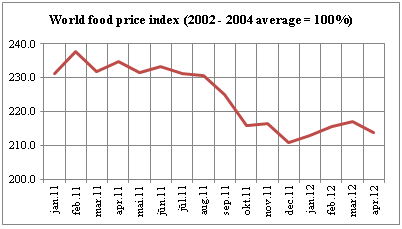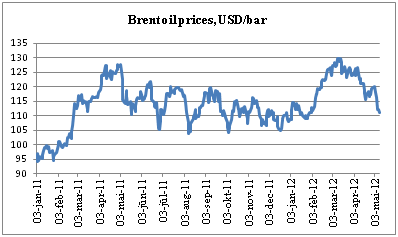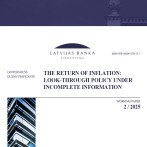No inflation-related surprises in April: it continues down
In April 2012, the annual inflation continued to drop, with its drop within a month, 0.5pp to 2.8%, reflecting the so-called base effect similar to last-year's rise in electrical power tariffs in April of last year and confirming the dependence of a small economy on the fluctuations in global prices.
In Latvia, domestic factors are still not the determining ones: inflation by and large forms in the interaction of supply factors, including under the impact of world food and oil prices. As the world oil prices gradually dropped a small drop in fuel prices was also observed at the end of April. The global food price index also dropped (by 1.4%). It did not have any substantial effect on the average monthly energy resource and food price levels, but it will be reflected in Latvia's consumer prices with a slight time lag. It will have a positive impact on the 9-month average residual (heavy) fuel oil prices on which the prices of the majority of Latvian energy sources – natural gas, thermal energy and, in part, electrical energy – prices depend. At the end of April and beginning of May a drop in prices by several santims per litre was already observed at petrol stations and that is likely to appear in the May inflation data.
The transfer of world food prices to the Latvian food price level is not complete. It is determined by the impact of taxes, proportion of domestic production, and export opportunities in the markets with rising prices. In this segment, however, the impact of world prices has been favourable:

Fig. 1 World food price dynamic. Source: FAO
External factors has also a partial influence on egg prices, impacting inflation both in March and April, whereas the expanding supply of the new season's vegetables brought their prices down slightly.
The rapid rise in fuel prices of previous months and the limited local government support for the subsidies for public transportation left an impact on the prices of tickets of inter-city transportation: the prices of transportation services increased 2.7% over a month and influenced the rise in regulated prices. The world oil price dynamic is currently favourable and even though one could argue about the stability of the trend, it diminishes the possibility that a substantial rise in prices of energy resources can be expected in Latvia in the coming months.

Fig. 2. Brent oil price dynamic. Source: Reuters
The weakness of the demand side is still reflected not only in the drop of the annual core inflation (it reached 1.6% in April), but also in the drop in the prices of several groups of goods: the prices of alcohol and tobacco, household goods, communication services, transport vehicle purchases and tourism services among others dropped in April month-on-month and the prices of footwear, many durable goods as well as some services went down year-on-year.
Overall, it is obvious that the impact of world prices on inflation in Latvia is favourable at the moment and stimulates a drop in inflation, whereas the demand side impact is rather weak despite the flash estimate of the first quarter of the year suggests that growth might have been more rapid than expected. Yet it is not equally distributed among sectors and in some branches of manufacturing it depends on some large orders thus not provoking a substantial pressure on the consumer price level.
Textual error
«… …»






